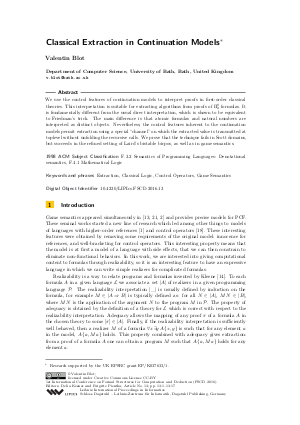Classical Extraction in Continuation Models
Author Valentin Blot
-
Part of:
Volume:
1st International Conference on Formal Structures for Computation and Deduction (FSCD 2016)
Part of: Series: Leibniz International Proceedings in Informatics (LIPIcs)
Part of: Conference: Formal Structures for Computation and Deduction (FSCD) - License:
 Creative Commons Attribution 3.0 Unported license
Creative Commons Attribution 3.0 Unported license
- Publication Date: 2016-06-17
File

PDF
LIPIcs.FSCD.2016.13.pdf
- Filesize: 465 kB
- 17 pages
Document Identifiers
Subject Classification
Keywords
- Extraction
- Classical Logic
- Control Operators
- Game Semantics
Metrics
- Access Statistics
-
Total Accesses (updated on a weekly basis)
0Document
0Metadata
Abstract
We use the control features of continuation models to interpret proofs in first-order classical theories. This interpretation is suitable for extracting algorithms from proofs of Pi^0_2 formulas. It is fundamentally different from the usual direct interpretation, which is shown to be equivalent to Friedman's trick. The main difference is that atomic formulas and natural numbers are interpreted as distinct objects. Nevertheless, the control features inherent to the continuation models permit extraction using a special "channel" on which the extracted value is transmitted at toplevel without unfolding the recursive calls. We prove that the technique fails in Scott domains, but succeeds in the refined setting of Laird's bistable bicpos, as well as in game semantics.
Cite As Get BibTex
Valentin Blot. Classical Extraction in Continuation Models. In 1st International Conference on Formal Structures for Computation and Deduction (FSCD 2016). Leibniz International Proceedings in Informatics (LIPIcs), Volume 52, pp. 13:1-13:17, Schloss Dagstuhl – Leibniz-Zentrum für Informatik (2016)
https://doi.org/10.4230/LIPIcs.FSCD.2016.13
BibTex
@InProceedings{blot:LIPIcs.FSCD.2016.13,
author = {Blot, Valentin},
title = {{Classical Extraction in Continuation Models}},
booktitle = {1st International Conference on Formal Structures for Computation and Deduction (FSCD 2016)},
pages = {13:1--13:17},
series = {Leibniz International Proceedings in Informatics (LIPIcs)},
ISBN = {978-3-95977-010-1},
ISSN = {1868-8969},
year = {2016},
volume = {52},
editor = {Kesner, Delia and Pientka, Brigitte},
publisher = {Schloss Dagstuhl -- Leibniz-Zentrum f{\"u}r Informatik},
address = {Dagstuhl, Germany},
URL = {https://drops.dagstuhl.de/entities/document/10.4230/LIPIcs.FSCD.2016.13},
URN = {urn:nbn:de:0030-drops-59913},
doi = {10.4230/LIPIcs.FSCD.2016.13},
annote = {Keywords: Extraction, Classical Logic, Control Operators, Game Semantics}
}
Author Details
References
-
Samson Abramsky, Kohei Honda, and Guy McCusker. A Fully Abstract Game Semantics for General References. In 13th Annual IEEE Symposium on Logic in Computer Science, pages 334-344. IEEE Computer Society, 1998.

-
Samson Abramsky, Radha Jagadeesan, and Pasquale Malacaria. Full Abstraction for PCF. Information and Computation, 163(2):409-470, 2000.

-
Roberto Amadio and Pierre-Louis Curien. Domains and Lambda-Calculi, volume 46 of Cambridge Tracts in Theoretical Computer Science. Cambridge University Press, 1998.

-
Stefano Berardi, Marc Bezem, and Thierry Coquand. On the Computational Content of the Axiom of Choice. Journal of Symbolic Logic, 63(2):600-622, 1998.

-
Ulrich Berger, Wilfried Buchholz, and Helmut Schwichtenberg. Refined program extraction from classical proofs. Annals of Pure and Applied Logic, 114(1-3):3-25, 2002.

-
Ulrich Berger and Paulo Oliva. Modified bar recursion and classical dependent choice. In Logic Colloquium 2001, Proceedings of the Annual European Summer Meeting of the Association for Symbolic Logic, volume 20 of Lecture Notes in Logic, pages 89-107. A K Peters, Ltd., 2005.

-
Valentin Blot and Colin Riba. On Bar Recursion and Choice in a Classical Setting. In 11th Asian Symposium on Programming Languages and Systems, volume 8301 of Lecture Notes in Computer Science, pages 349-364. Springer, 2013.

-
Harvey Friedman. Classically and intuitionistically provably recursive functions. In Gert Müller and Dana Scott, editors, Higher Set Theory, volume 669 of Lecture Notes in Mathematics, pages 21-27. Springer, 1978.

-
Timothy Griffin. A Formulae-as-Types Notion of Control. In 17th Symposium on Principles of Programming Languages, pages 47-58. ACM Press, 1990.

-
Russ Harmer. Games and full abstraction for non-deterministic languages. PhD thesis, Imperial College London (University of London), 1999.

-
Hugo Herbelin. On the Degeneracy of Sigma-Types in Presence of Computational Classical Logic. In 7th International Conference on Typed Lambda Calculi and Applications, Lecture Notes in Mathematics, pages 209-220. Springer, 2005.

-
Martin Hofmann and Thomas Streicher. Completeness of Continuation Models for λμ-Calculus. Information and Computation, 179(2):332-355, 2002.

-
Martin Hyland and Luke Ong. On Full Abstraction for PCF: I, II, and III. Information and Computation, 163(2):285-408, 2000.

-
Stephen Cole Kleene. On the Interpretation of Intuitionistic Number Theory. Journal of Symbolic Logic, 10(4):109-124, 1945.

-
Jean-Louis Krivine. Dependent choice, `quote' and the clock. Theoretical Computer Science, 308(1-3):259-276, 2003.

-
Jean-Louis Krivine. Realizability in classical logic. Panoramas et synthèses, 27:197-229, 2009.

-
Yves Lafont, Bernhard Reus, and Thomas Streicher. Continuations Semantics or Expressing Implication by Negation. Technical Report 93-21, Ludwig-Maximilians-Universität, München, 1993.

-
James Laird. Full Abstraction for Functional Languages with Control. In 12th Annual IEEE Symposium on Logic in Computer Science, pages 58-67. IEEE Computer Society, 1997.

-
James Laird. Bistable Biorders: A Sequential Domain Theory. Logical Methods in Computer Science, 3(2), 2007.

-
Alexandre Miquel. Existential witness extraction in classical realizability and via a negative translation. Logical Methods in Computer Science, 7(2), 2011.

-
Hanno Nickau. Hereditarily Sequential Functionals. In Third International Symposium on Logical Foundations of Computer Science, Lecture Notes in Computer Science, pages 253-264. Springer, 1994.

-
Paulo Oliva and Thomas Streicher. On Krivine’s Realizability Interpretation of Classical Second-Order Arithmetic. Fundamenta Informaticae, 84(2):207-220, 2008.

-
Michel Parigot. λμ-Calculus: An Algorithmic Interpretation of Classical Natural Deduction. In 3rd International Conference on Logic Programming and Automated Reasoning, volume 624 of Lecture Notes in Computer Science, pages 190-201. Springer, 1992.

-
Christophe Raffalli. Getting results from programs extracted from classical proofs. Theoretical Computer Science, 323(1-3):49-70, 2004.

-
Peter Selinger. Control categories and duality: on the categorical semantics of the λμ calculus. Mathematical Structures in Computer Science, 11(2):207-260, 2001.

